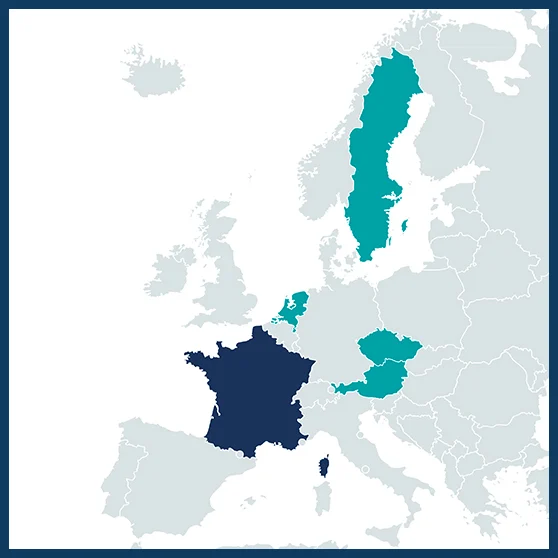01.03.2022 – 28.02.2025
€ 974,170
David A. BOHAN
david.bohan@inrae.fr
Coordinator: Agroecology, Bourgogne University/CNRS/INRAE/InstitutAgro, Dijon, France
Zoology, University of Innsbruck, Innsbruck, Austria
Agroecology and biodiversity, Solagro, Toulouse, France
Economics, Czech University of Life Sciences, Prague, Czech Republic
Functional Ecology, Crop Research Institute, Prague, Czech Republic
Crop Systems Analysis, Wageningen University, Wageningen, Netherlands
Ecology, Swedish University of Agricultural Sciences, Uppsala, Sweden

Arable ecosystems are mosaics of terrestrial and aquatic biomes that are intimately interlinked and must be considered together for robust conservation and restoration. Intensive land use, and use of agro-chemicals in particular, have led to a significant degradation of the biodiversity and ecosystem services in both terrestrial and freshwater biomes. FRESHH aims to counteract this by reducing the need for herbicide applications via weed seed regulation by carabid beetles. The key constraint in the adoption of carabids is uncertainty in effectiveness and the acceptability of biological weed control for farmers. Agro-chemicals such as herbicides are a staple of farm management and reductions in their use is a cause of considerable concern to farmers, despite the potential benefits to the environment.
FRESHH sees the agricultural landscape as a combination of three layers: farmed fields; semi-natural habitats; and freshwaters. Herbicides applied in fields may runoff into freshwaters. The installation of semi-natural habitats can intercept this herbicide runoff and also support carabids that reduce the need for herbicide applications in field. FRESHH will work to understand the costs and benefits, and opportunities and constraints of supporting weed seed feeding carabids to reduce reliance on herbicides.
The transdisciplinary approach of FRESHH builds upon an existing network of European farmers and the reuse of existing data for carabids, weeds and management. This includes employing existing eDNA methodologies and knowledge to assess the ecological status of freshwaters. The experimentation during the project will evaluate: carabid, weed and water quality responses across established landscape gradients of habitat; and socio-economic and agronomic research with our farmer network.
Working with farmers, FRESHH will co-develop acceptable practices to conserve carabid beetles, off-setting herbicide use, restore semi-natural flora within fields and in the neighbourhood of fields, and benefit aquatic biodiversity at the EU scale. FRESHH will attempt to show whether the effects of this approach would ‘rewild’ the weed flora of farmland fields, supporting wider farmland biodiversity and ecosystem services, and assure the ecological status of farmland freshwaters by reducing run-off of herbicide and other agro-chemicals. Leveraging benefits across the landscape layers, through improved farmer knowledge and wider stakeholder cooperation, will lead to greater adoption, and thereby restoration, and serve as a model for more sustainable, landscape-scale practices.
FRESHH will work to understand the costs and benefits, and opportunities and constraints of supporting weed seed feeding carabids to reduce reliance on herbicides and restore terrestrial and aquatic habitats. Leveraging benefits across landscape layers, through improved farmer knowledge and stakeholder cooperation, will lead to greater adoption and restoration, and serve as a model for more sustainable, landscape-scale practices.
The FRESHH goals of better understanding the opportunities and constraints of rewilding and agricultural landscape conservation, for better environmental health, are core requirements of several leading visions and policies for the future of farming, including the UN SDGs, UN Decade on Ecosystem Restoration, EU Habitats Directive, The Greening and Integrated Pest Management measures of the Common Agricultural Policy and the Green Deal. These goals and requirements have recently been highlighted in policies and agreements including IPBES, the EU Nature Restoration and EU Biodiversity Strategies, and the Water Framework Directive.
FRESHH will work in all partner countries to understand the agroecology of farming practices in the three layers of the agricultural landscape. Using a replicated landscape experiment, centred on 60 fields, FRESHH will sample carabid species abundance, weed abundance and diversity, herbicide practices and freshwater biodiversity (using eDNA approaches). These data will enable us to link, mechanistically, farmed field, semi-natural habitat and freshwater ecological responses to management. This data will feed into our socio-economic work with farmers to test whether including agronomic, socio-economic and ecological information from the different landscape layers will leverage greater adoption of management to conserve carabid beetles, off-set herbicide use, restore semi- natural flora within fields and in the neighbourhood of fields, and benefit aquatic biodiversity.
- Agence Nationale de la Recherche (ANR), France
- Austrian Science Fund (FWF), Austria
- Technology Agency of the Czech Republic (TAČR), Czech Republic
- Ministry of Agriculture, Nature and Food Quality (LNV), Netherlands
- The Swedish Environmental Protection Agency (SEPA), Sweden